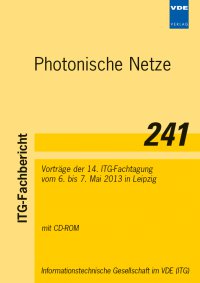Carrier-Interferometry-OFDM for Nonlinear Tolerance Improvement in Optical Systems with Direct Detection
Conference: Photonische Netze - Vorträge der 14. ITG-Fachtagung
05/06/2013 - 05/07/2013 at Leipzig, Germany
Proceedings: Photonische Netze
Pages: 5Language: englishTyp: PDF
Personal VDE Members are entitled to a 10% discount on this title
Authors:
Ali, Abdulamir; Leibrich, Jochen; Rosenkranz, Werner (Christian-Albrechts-Universität zu Kiel, Kaiserstr. 2, 24143 Kiel, Germany)
Abstract:
In this paper, carrier-interferometry orthogonal frequency division multiplexing (CI-OFDM) technique is applied with direct detection optical OFDM (DD-OFDM) for peak-to-average power ratio (PAPR) reduction. We compare by simulation the performance of a CI-DD-OFDM system with that of conventional DD-OFDM. CI-OFDM reduces the PAPR; this in turn improves the nonlinear tolerance in optical-OFDM systems. 4-QAM and 16-QAM modulation formats are considered here for a single channel and 5 channels WDM transmissions. Noise performance comparisons have been investigated with back-to-back (B2B) transmission; the results show that for CI-DD-OFDM the OSNR is improved by ~1 dB and < 0.5 dB for 4-QAM and 16-QAM, respectively. For nonlinearity comparisons with single channel, the CI-DD-OFDM system Q-value with 4-QAM is improved by ~ 3 dB and ~ 2 dB for 80 km and 800 km transmissions, respectively, while for 16-QAM it is improved by ~ 2 dB and ~ 1 dB for 80 km and 800 km transmissions, respectively. For nonlinearity comparisons with 5 WDM channels, the CI-DD-OFDM system Q-value with 4-QAM is improved by ~ 1.6 dB and ~ 1 dB for 80 km and 800 km transmissions, respectively, while for 16-QAM it is improved by ~ 1.2 dB and ~ 0.8 dB for 80 km and 800 km transmissions, respectively. Thus, the CI-DD-OFDM system outperforms the conventional DD-OFDM in terms of nonlinearity tolerance.


